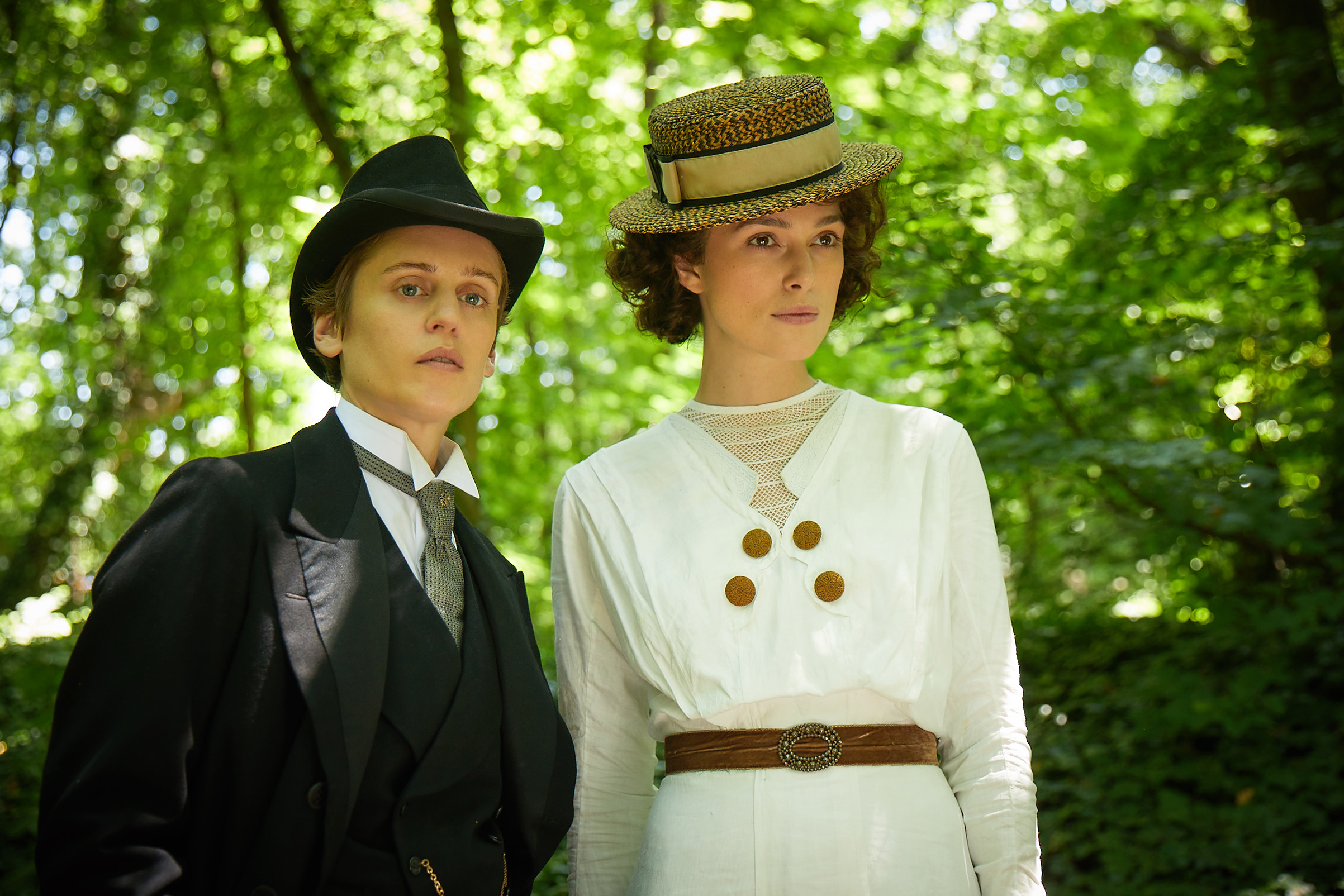Handsome, historical, breezily progressive and featuring a radiant Keira Knightley, Colette is a meditation of the spirit of an artist—here a turn of the 20th century proto-feminist and erotic fiction novelist—out of her time. In a period picture with a notable contemporary relevance, Knightley impresses across decades of subjugation and hard-won liberation, making Colette one of the year’s most enjoyable movies.
In life, French author, actress and trendsetter Sidonie-Gabrielle Colette (Knightley) was a trailblazer for a century of women, leading a daring life that inspired her much-loved fictions (up to and including 1944’s Gigi) which had significant cultural and social impacts. She brought change to French attitudes and mores—but could she bring it to her own life?
An impeccably crafted tale of bohemian self-actualization, Colette opens in late 19th Century Burgundy with titular French country girl Colette courted by priggish, flamboyant Willy (terrific Dominic West), a self-aggrandizing Parisian critic, publisher, philanderer and author in his own right.
Born Henry Gauthier-Villars with a nom de plume of Willy, he’s a classic narcissist, shaking down author fees at The Factory, his always-on-the-verge-of-bankruptcy publishing house, or prattling on to Colette about men being “the weaker sex” as justification to cavort with prostitutes. A flair for dramatic persuasion—whether stiffing his scribes’ advances, schmoozing his adoring public or wooing the initially naive Colette—proves effective in securing her affections and, later, an open marriage.
Once Colette enters Parisian society she rejects its pomp and artifice for her true passion, writing. But like all great writers, she seeks confirmation of her gifts, and once Willy gets wind of her raw talent, he locks her away for hours to create manuscripts. This, of course, gives him plenty of playtime with the local ladies, a discovery that sends traditional, demure Colette back to the countryside. But not for long.
It’s the lying Colette can’t abide, and once she has Willy’s word that he’ll be honest about his urges (though not curtail them), the pair reunites and boom—a distinctly modern novel is born. Of course, Colette is the author and Willy only the publisher, but his professional assertion that no one will take a woman writer seriously, and that the pair stands to achieve great success should he be credited should he get the byline, causes Colette to reluctantly participate in the ruse. Where have we heard this before? Why, this season in The Wife, featuring a terrific Glenn Close as the private pen behind celebrated author and husband Jonathan Pryce’s Nobel Prize.
As the years wear on and Colette’s wildly successful modern heroine, Claudine, becomes an icon in French society and somewhat scandalous role model for progressive young Parisian women, Colette herself looks to what’s possible—and conceivable—outside of fiction.
Willy’s insistence on an unorthodox marriage, which Colette eventually accepts, is libertine in the textbook sense, giving Colette freedom to explore her own desires, which extend to both sexual and emotionally meaningful relationships with women. Enter a come-hither American heiress (Eleanor Thompson, employing a caricatured Southern drawl) and a sensual experimentation which so excites Willy that he of course, wants in on the action. Knightley throws herself headlong into these attractions, releasing palpable, pent-up desires.
Colette’s most meaningful relationship, and one whose generosity allows her to come into her own as an artist and woman, was with cross-dressing “Missy” (a sensational Denise Gough), a manor born aristocrat with the androgyny of a tuxedoed Marlene Dietrich and a boundlessly supportive nature. In the film’s second half, Missy evolves into perhaps Colette’s one true love, and her theatrical partner in an onstage lesbian clinch that causes an all-out brawl at the Moulin Rouge. As Colette flirts with performance, becoming a mime and developing a peer group of actors and creatives, she no longer needs Willy’s protection.
And why should she? After ghostwriting a cultural sea change, she’s had it with the shadows. After cash-strapped Willy secretly sells of all rights to Colette’s character and legacy, their marital dissolution produces a confrontational monologue delivered by Knightley that is, in a word, electrifying. Wisely, Washmoreland allows his camera to capture Colette’s wrath in a long take, hypnotic close-up.
In Colette, the chief pleasure is seeing Knightley shed West’s would-be Svengali and deliver Colette’s liberation in a time and place where a free-thinking, independent woman was certain to be socially banished, living her truth even as her livelihood has been stripped out from under her.
Colette’s satisfying final moments featuring real life photos depict not so much a woman out of time but one driving it, pushing women’s rights forward with one personal milestone at a time.
One might think that in the era of #MeToo, director Wash Westmoreland (who co-wrote the screenplay with the Richard Glatzeran Rebecca Lankiewicz) might hammer the picture home in heavy handed fashion, but his approach isn’t a polemic—it’s entertainment. Special mention should be made of veteran actress Fiona Shaw as Colette’s quietly revolutionary mother, the film’s deeply saturated widescreen cinematography by Giles Nuttgens and full-bodied score by Thomas Adès, which sounds right out of classic Richard Robbins-Merchant Ivory.
That’s high praise, and the movie deserves it.
3 1/2 stars.



